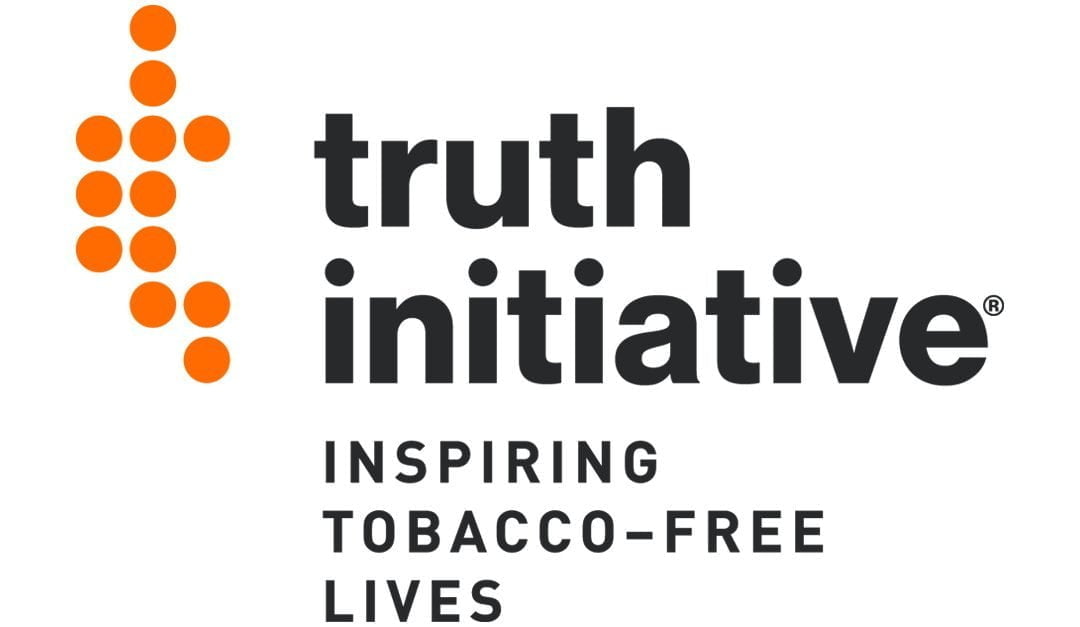Better Than Most is a regular feature of The Business of Giving, examining the best places to work among social good businesses and nonprofit organizations.
Denver: And this evening, we will be heading down to Washington DC and the headquarters of Truth Initiative. They are America’s largest non-profit public health organization dedicated to making tobacco use a thing of the past. We’ll begin with their President and CEO, Robin Koval, and she’ll be followed by other members of Truth Initiative Team.
Robin: I always feel that if you don’t make an attempt to really create and direct a culture of an organization, it gets created around you. It happens whether you like it or not. It’s what is in the ether of the office every single day. You can let it happen to you or you can make sure that it’s in place, and that the people that are here are helping to build it consciously. So, that’s part of where my feelings come from. The other thing that I think is really important for us….and I think especially important in nonprofits, we do deal with serious issues. We talk about tobacco all the time. We know the devastating deadly effects of tobacco. We are saving lives, and that’s serious business. But I also think we do a really good job and make a concerted effort of also understanding that the role of fun and play and being a creative organization and looking for ways to inspire ourselves through the use of things that are fun and playful.
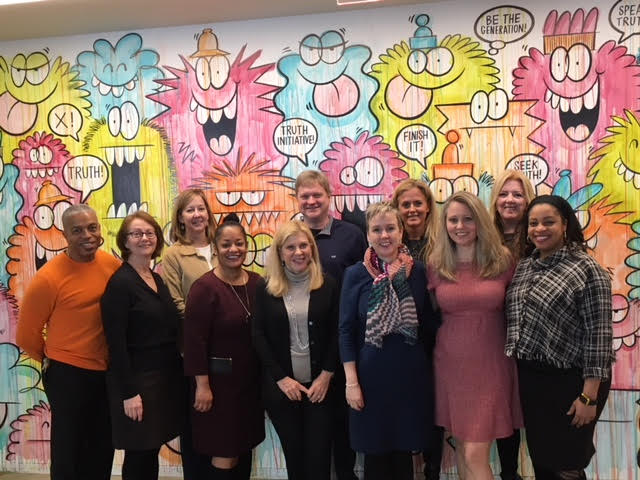
Donna: One of the ways that we try and make sure that the team members who bring onboard are comfortable in a Team Science environment is really to talk about how they’ve contributed in the past, how important authorship policy is to them, and how comfortable they are in sharing information and ideas rather than sort of being more individually and self-focused. So, I think that collaboration is really, really important in developing a team effort but particularly around Team Science.
Amy: I also have worked in the nonprofit world for 20-plus years, and the way that the organization takes care of their employees is pretty amazing. We recognize everybody for their great work. But I think most importantly, we listen to people, and this is really important for the work that I do because we are out there in the communities, talking to young people every day, and we listen to what they have to say and their stories and why they care about tobacco. So, that’s incredibly important to me.
Nicole: I think culture starts from the top-down. I think culture is about transparency, honesty, truth. It’s what we stand for, and that’s what we exemplify in every single employee here. I think what brings me to work every single day are the people, and the energy, and the passion, and the debate. It’s not an easy place to work, and I love that. I love that challenge. Every day we ask our team, how are you fighting Big Tobacco today, and everybody’s got a different answer. Once a week, we get together, and we have what we call “quote fights” so life quotes. Each of us sort of competes on who won that life quote for that week, so that we can have that for the mantra for the next week. I wouldn’t change a thing about this place.
Anna: One of the greatest things I believe that helped us is the office space. People were going crazy about moving to an open environment. What I love is that we all came, we got used to it. People love it now. One of the greatest comments I had was someone who is at a VP level who was in an office who is now in an open space… I go and check and I’m like, oh how’s it going? How do you like the space, and she said, this is the best space I’ve ever had in my career. I’m like, wow, you’re not in an office anymore. She’s like, I was so afraid of that, but what I find is that I can talk to people without setting up a meeting and wasting all that time. I see people going down the hall, I grab them…
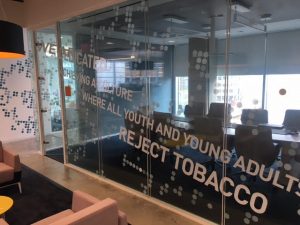 Dave: What I love about this place and having been here now 15 years, when I walked in the door, the youth smoking rate in the United States was about 22%, 23%. Now, it’s 5.4%. That is millions of years of lives that’s saved from disease, from death, from misery. I think when people think about tobacco, they think about the death rate. We see real numbers, and I think a lot of times, people in social cause organizations are fighting the good fight but they don’t get to see this dramatic results as we do. There’s really a primary reason that we do it. It’s because we’re completely focused on the metrics. We know we’re going, we hold ourselves accountable, and we’ve gotten there. I could not be more proud of the work we’ve done.
Dave: What I love about this place and having been here now 15 years, when I walked in the door, the youth smoking rate in the United States was about 22%, 23%. Now, it’s 5.4%. That is millions of years of lives that’s saved from disease, from death, from misery. I think when people think about tobacco, they think about the death rate. We see real numbers, and I think a lot of times, people in social cause organizations are fighting the good fight but they don’t get to see this dramatic results as we do. There’s really a primary reason that we do it. It’s because we’re completely focused on the metrics. We know we’re going, we hold ourselves accountable, and we’ve gotten there. I could not be more proud of the work we’ve done.
Nicole: One really important thing in my head is that we have a strategy. I worked at several nonprofits, and they have had what I call shiny objects syndrome. It’s like, something pops up on the scene, we got to work on that. Another thing pops up on the scene, we got to work on that! This organization is really strategy-focused. We have a strategic plan. Everyone follows it. We all know where we’re going and what we should be working on to achieve the mission.
Starla: I remember being in school and seeing the Truth ads and being like, I need to work there. I came, and I worked here for four years, and I left and worked at many other places but there was something about Truth that always drew me back. I think it really is the culture. I think that a lot of the senior staff have been here for the entire time. They’re really caring, and you know that they care about your career development. You know that they want to give you the opportunity to succeed. It’s been a great opportunity, and I’m so happy that I came back.
Tricia: We are making a difference, and the people at Truth are amazing. We constantly do surveys. You didn’t need a survey to know this, but 90% of the people love working with each other, and that is so evident when you walk through the doors. I feel really lucky to be doing this job and to know that I personally am making a difference with my colleagues at Truth Initiative.
Amanda: To me, culture is somewhat synonymous with the name that we made up for this relatively new expertise center. We are known as Innovations, and I think our work here particularly and throughout the foundation is innovative. It’s creative. It’s crafty. It’s nimble. It’s flexible. I think that really permeates through all the different aspects of our work. We’ve had the good fortune to be able to acknowledge talent and to promote people by creating new titles, being innovative with hiring and wants performance management to recognize why people come to Truth Initiative; what they want to get out of this experience and to help them grow and to nurture both early career, mid-career and everybody throughout their career life cycle.
Donna: Several years later, we found ourselves in a litigation with one of the large tobacco manufacturers. We spent five years fighting. As one who is deposed and really spent a lot of time and effort as part of litigation, I can tell you that the fearlessness of the people who sit in this organization is a key characteristic.
I think because we were born of a litigation and have suffered through litigation, there comes a tenacity and flexibility I think that is really at the ethos of the culture here. I think part of that gets reflected in — I’ll call it interdisciplinary. But we come to this work each from our own areas of expertise, and I think that that is both the challenge and the brilliance of the organization that helps build the culture.
Nicole: One of the processes that we just did today, which was funny, was we were just introducing newhires. You could just have gone with their resume or their background or their education, but instead we started talking about what made them unique, what were their passions, what kind of food do they like, who are they as people; and I started to think about our team and how we hire for those people that are opposite of ourselves, so that we can really have rich debate and good thought leadership. There are people in my team who went to school for equestrian arts. There are people on my team who learned how to twerk. It can straddle all kinds of different things.
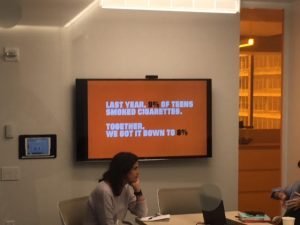 Anna: Just the process. We involve people from different departments. It’s not – oh, someone in Marketing, only marketing people will interview them. We said, no, they’re going to be working with the research team, so we definitely have to have someone from research ask them questions and fill them out. So, I think the process, the onboarding, we always have people tell us they’ve never had this many trainings and been able to get a feel of the organization, talked to different people, learn things before just being thrown in.
Anna: Just the process. We involve people from different departments. It’s not – oh, someone in Marketing, only marketing people will interview them. We said, no, they’re going to be working with the research team, so we definitely have to have someone from research ask them questions and fill them out. So, I think the process, the onboarding, we always have people tell us they’ve never had this many trainings and been able to get a feel of the organization, talked to different people, learn things before just being thrown in.
Dave: For every opening, we make sure we canvas the entirety of people. We promote it in minority publications or minority job groups. In professional societies, we make sure we advertise everywhere. We make sure we interview a broad diversity of candidates, and it’s reflected in who we hire.
Derrick: I’ve been asked recently to speak at some cybersecurity conferences. I speak from a nonprofit perspective. It’s a little different because most of the people I’m up against are the DOD or big business or corporations and other type of companies. But when I go out and when I mention that I’m from the Truth Initiative, I see an audience that says, my daughter watches your campaigns, my son, or somebody in their families has actually benefited from the fact the programs that we had, is just a good sense of pride to be able to be a part of an organization like that that has actually influenced and gives us feedback that we’re doing something positive, and people actually listening to move forward.
Nicole: I’ll just say one thing about feedback. I have a very blunt style, and I really appreciate when people don’t beat around the bush, and I feel like we’re a family here, and it really feels like we can speak honestly to each other for better or for worse. People are really direct which I think helps with our communications on our daily work.
Tricia: Our motto is, speak, seek, and share the truth. It is also an atmosphere where we can speak freely not just about what’s wrong or if you have a problem or if you need to just be direct with someone. But if you have an idea, ideas can come from anywhere in the organization and be brought to bear. I think that’s so important because that prevents the silo effect. I don’t think we have silos because we have one common enemy, and that’s Big Tobacco. While we are very competitive, we’re not competing with each other to see whose department deliver the best profits or the best numbers. We’re competing against Big Tobacco. We are the David to that Goliath, and we’re kicking his butt. Pun intended.
Amanda: There’s a “you’re leaving the ivory tower and heading to a nonacademic position. How is that?” The thing that was my go-to response, and it was probably within just the first couple of months of being here was it’s really easy to get good work done. It’s really easy to set a goal, to map out a path to get to that goal because people do their jobs, they do them well.
Denver: I want to thank all those who participated in this segment. Tricia Kenny, Donna Vallone, Amy Taylor, Nicole Dorrler, Anna Spriggs, Dave Dobbins, Derrick Butts, Nicole Dueffert, Amanda Graham and Starla Stiles. If you would like to hear this again, read the transcript or see pictures of the participants and the Truth Initiative offices, all you need to do is go visit denver-frederick.com and we’ll have a link there to my full interview with Robin Koval, the President, and CEO of Truth Initiative.
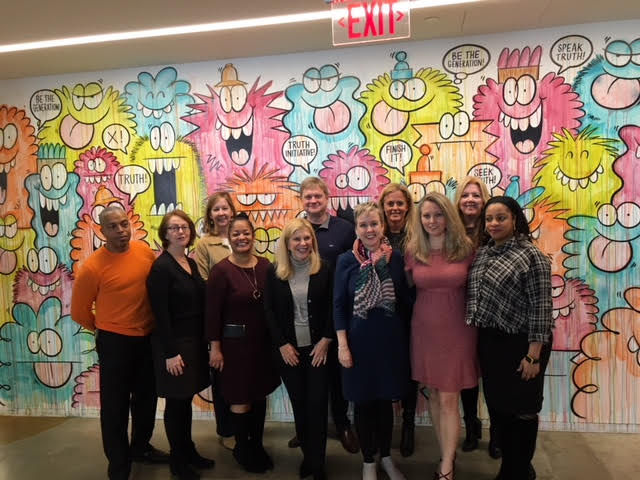
The Business of Giving can be heard every Sunday evening between 6:00 p.m. and 7:00 p.m. Eastern on AM 970 The Answer in New York and on iHeartRadio. You can follow us @bizofgive on Twitter, @bizofgive on Instagram and at http://www.facebook.com/BusinessOfGiving

